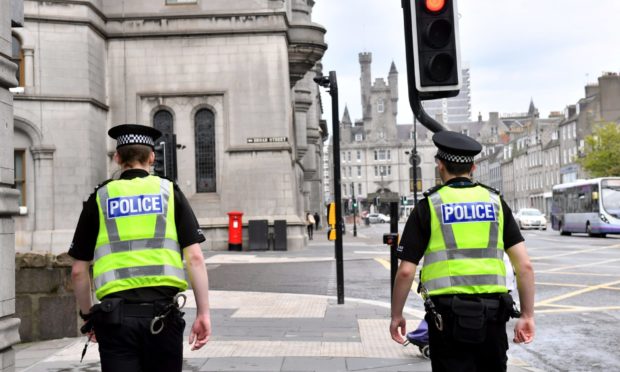Police have been stopping more than 50 north and north-east Covid rule-breakers on average every day since the start of the latest national lockdown.
The shocking figures came as Aberdeen Sheriff Court convicted its first person for refusing to wear a face covering in a public place.
All of mainland Scotland was placed under Level 4 restrictions on Boxing Day, meaning people must remain at home unless carrying out an essential activity.
But new figures have laid bare the numbers of people flouting the rules and being stopped by police.
Since Boxing Day, more than 1,300 people in the north and north-east have been told by officers to stop what they are doing, with two incidents requiring officers to use “reasonable force” in the process.
A further 98 people have been issued fines for breaking coronavirus laws, while five have been arrested.
The stats relate to more than 140 incidents in Aberdeen, 55 in Aberdeenshire and 31 in Moray.
Further north, there were 34 in the Western Isles, 70 in Inverness and 110 in the north Highlands.
Over the same period there were almost 1,000 in the southern Highlands.
This included a string of incidents in the days after Hogmanay – with officers speaking to more than 250 people on January 2, and 221 people on January 3.
‘People think the rules don’t apply’
Earlier this week Aberdeen councillor Jennifer Stewart hit out at the hosts and guests of house parties, calling them “morally bankrupt”.
And yesterday First Minister Nicola Sturgeon urged this “small minority” to take more responsibility.
“Maybe it is a misunderstanding with what they’re allowed to do and, when it’s pointed out to them, they’re quite happy to rectify their behaviour,” she said.
“But there are people who think the rules don’t apply to them.
“I think it is a really small group, but their actions can have big consequences right now.”
Ms Sturgeon also slammed the “nonsense” conspiracy theories suggesting the pandemic was made up as a means of controlling the population.
She said, unlike an extreme sport where the participant is only putting their own health at risk, one person breaking coronavirus rules could cause the disease to spread to others.
Public support ‘more important’ than fines
The shocking figures were discussed at a meeting of the Scottish Police Authority yesterday.
Human rights lawyer John Scott QC, who has been scrutinising the force’s use of coronavirus-related powers, said overall public support is more important for compliance than simply having a large police crackdown.
He said coronavirus breaches cover only a “small percentage of a small percentage” of overall policing activity.
And he called for people to pay more attention to the “widespread adherence” of the rules, rather than the so-called “Covidiots” breaching them.
Without this, he said: “There’s a possibility the majority of the people making these sacrifices and significant efforts then feel as though they are the Covidiots.
“That larger truth can be hidden by too much emphasis on enforcement.”
Mr Scott added: “Enforcement alone can’t address something like the situation we’re in.
“It requires public buy-in and confidence, and the public have shown they’re perhaps better equipped to understand things than some of the politicians.
“Especially with some of the promises politicians feel obliged to make, like ‘We’ll be OK by Christmas’.
“I think the public understands these remarks are made to keep spirits up but they’re not realistic and are very rarely achieved.
“High levels of support remain more important than higher levels of fine.”
Scottish Conservative shadow justice secretary and north-east MSP Liam Kerr said: “These figures show the high number of reports police are receiving and acting on across the north-east.
“It’s vital officers continue to use common sense and discretion to work with residents so everyone is kept safe.
“However people must take personal responsibility to ensure these incidents can be reduced.
“Having a house party or small gathering is a complete disregard for the efforts we are all putting in to come out of these restrictions.”

